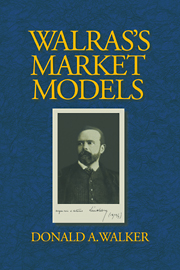Book contents
- Frontmatter
- Contents
- List of figures
- Preface
- Acknowledgments
- Introduction
- Part I The models of the mature phase
- 1 Walras's conception of a competitive market economy
- 2 The mature models: Not a normative scheme
- 3 The mature models of the barter of stocks of commodities
- 4 Institutions and participants in the model of monetary oral pledges markets
- 5 Disequilibrium and equilibrium in the model of monetary oral pledges markets
- 6 The structure of the mature nondurable consumer commodities model
- 7 The equilibrating processes in the mature nondurable consumer commodities model
- 8 The structure of the mature comprehensive model
- 9 The equilibrating processes in the mature comprehensive model
- 10 Walras and his critics on the maximum utility of new capital goods
- 11 The mature models of the money market
- 12 Iteration in the mature model of tatonnement
- 13 The mature model of the behavior of the entrepreneur
- 14 Walras versus Edgeworth on tatonnement processes
- Part II The models of the phase of decline
- References
- Collation of editions of the Eléments
- Index
5 - Disequilibrium and equilibrium in the model of monetary oral pledges markets
Published online by Cambridge University Press: 05 May 2010
- Frontmatter
- Contents
- List of figures
- Preface
- Acknowledgments
- Introduction
- Part I The models of the mature phase
- 1 Walras's conception of a competitive market economy
- 2 The mature models: Not a normative scheme
- 3 The mature models of the barter of stocks of commodities
- 4 Institutions and participants in the model of monetary oral pledges markets
- 5 Disequilibrium and equilibrium in the model of monetary oral pledges markets
- 6 The structure of the mature nondurable consumer commodities model
- 7 The equilibrating processes in the mature nondurable consumer commodities model
- 8 The structure of the mature comprehensive model
- 9 The equilibrating processes in the mature comprehensive model
- 10 Walras and his critics on the maximum utility of new capital goods
- 11 The mature models of the money market
- 12 Iteration in the mature model of tatonnement
- 13 The mature model of the behavior of the entrepreneur
- 14 Walras versus Edgeworth on tatonnement processes
- Part II The models of the phase of decline
- References
- Collation of editions of the Eléments
- Index
Summary
Oral pledges markets, such as securities exchanges, are an important part of the market system, and accordingly were assigned an important role in Walras's models of general equilibrium. His conception of their disequilibrium behavior was an essential part of his wider conception of the functioning of a freely competitive economy. The model of monetary oral pledges markets was fruitful in that major aspects of it were incorporated into the modern theory of competitive markets, but the model itself and the insights that can be derived from examining it have been neglected. Moreover, it has been incorrectly alleged that the features of auction markets can be substituted in place of the ones Walras assumed, without affecting the outcome. This chapter analyzes the functioning of the model, shows that its outcomes are different from auction markets, and identifies its merits and deficiencies.
Introduction
Expressing a view that has become general concerning Walras's model of exchange in oral pledges markets, William Jaffé maintained that Walras neglected their disequilibrium behavior (Jaffé 1981, pp. 327–28 [257–58], 322–23 [252–54], 330 [261]). According to Jaffé, Walras concentrated on equilibrium conditions, developed an analysis that was “consciously and deliberately confined within a strictly statical framework” (ibid., p. 327 [258]), and thus failed to “depict an actual process” of adjustments that traders make in markets (ibid., p. 327 [257–58]). Walras did not mean his treatment of price formation to be an account of “market events” (ibid., p. 327 [258]).
- Type
- Chapter
- Information
- Walras's Market Models , pp. 93 - 112Publisher: Cambridge University PressPrint publication year: 1996



